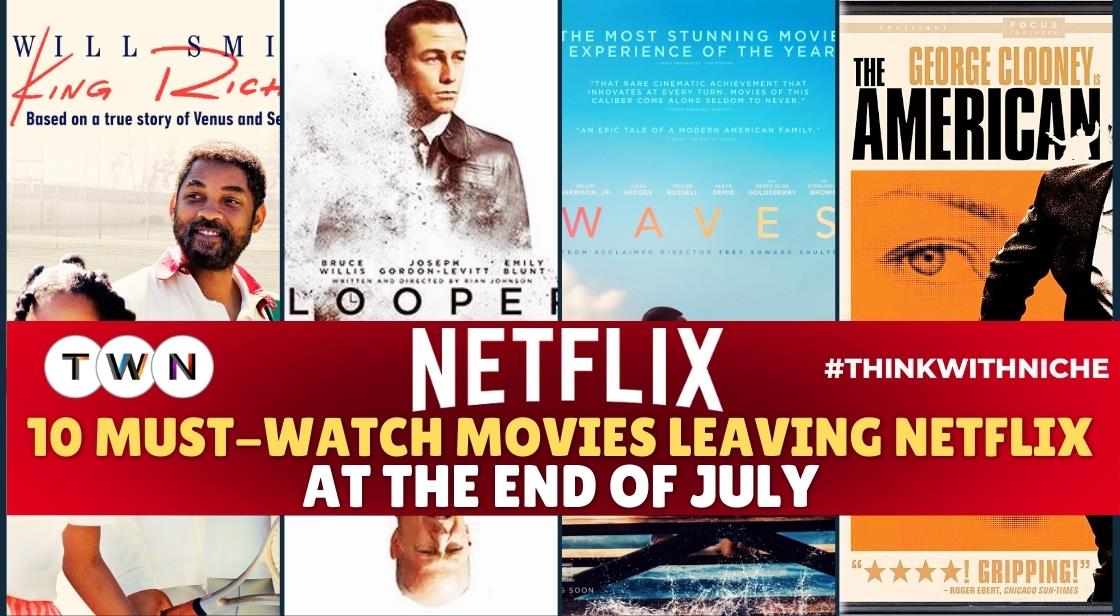10 Must-Watch Movies Leaving Netflix at the End of July

Blog Post
As July comes to a close, Netflix is bidding farewell to some exceptional films that you won't want to miss. This list highlights ten top movies that have captivated audiences with their unique storytelling, powerful performances, and innovative cinematic techniques.
Among these films, "King Richard" (2021) stands out with its Oscar-winning portrayal of Richard Williams by Will Smith, offering an inspiring look into the Williams family's journey to greatness. "Looper" (2012), directed by Rian Johnson, explores the complexities of time travel and human destiny through a gripping narrative and stellar performances by Joseph Gordon-Levitt and Bruce Willis.
Trey Edward Shults' "Waves" (2019) is another must-watch, noted for its emotional depth and innovative cinematography. M. Night Shyamalan's "Glass" (2019) concludes his unique superhero trilogy with an engaging clash of characters.
"Serial Mom" (1994), a dark comedy by John Waters, provides a satirical critique of suburban life with Kathleen Turner's unforgettable performance. Tim Burton’s "Big Eyes" (2014) delves into the true story of artist Margaret Keane, offering a visually striking examination of creativity and identity.
For action enthusiasts, "Resident Evil: Retribution" (2012) delivers high-octane thrills, while "Fresh" (1994) presents a poignant crime drama set in a challenging urban environment. "The American" (2010), featuring George Clooney, combines sophisticated storytelling with intense character study, and Luc Besson's "Lucy" (2014) explores the limits of human potential with Scarlett Johansson's compelling performance.
These films, each unique in their own right, offer something for every viewer. Make sure to catch them before they leave Netflix by the end of the month!
10 Top Movies Leaving Netflix by the End of July – Don’t Miss Out!
King Richard (2021)
Exceptional Acting and Dramatic Impact
While watching King Richard, I was struck by the profound quality of acting that is increasingly rare in contemporary cinema. The film showcases powerful performances, especially from Will Smith, who won an Oscar for his portrayal of Richard Williams. Alongside him, Aunjanue Ellis, Saniyya Sidney, and Demi Singleton deliver standout performances that enhance the film's emotional depth. The raw, unfiltered drama and the compelling portrayal of a family's journey toward greatness create a captivating viewing experience.
Plot and Direction of King Richard
Directed by Reinaldo Marcus Green, King Richard is a biographical sports drama that chronicles the life of Richard Williams, the father and coach of tennis legends Serena and Venus Williams. The film delves into Williams' relentless dedication to coaching his daughters, despite facing skepticism and numerous challenges from the tennis community. The story highlights the family's unity and determination, ultimately showcasing their triumph over adversity.
Why You Should Watch It
King Richard stands out for its remarkable dramatic performances and the inspiring story of the Williams family. The film’s portrayal of their struggle and success is both moving and motivational, offering a rare and immersive look into the personal and professional challenges they faced. If you haven’t seen it yet, the film's powerful acting and compelling narrative make it a must-watch.
Looper (2012)
Director's Background and Vision of Looper
Before Rian Johnson faced backlash for directing Star Wars: The Last Jedi, he was celebrated as an independent filmmaker with a distinct vision. Known for his innovative storytelling and unique approach, Johnson crafted films like Brick and The Brothers Bloom, which showcased his flair for inventive narrative structures and suspense. However, it was Looper where Johnson's creative ideas truly electrified audiences.
Plot Overview of Looper
Looper is set in a distant future where time travel exists, but is strictly controlled by criminal organizations. The protagonist, Joe (played by Joseph Gordon-Levitt), is a "looper" – a hitman tasked with eliminating individuals sent back from the future. The twist in the plot occurs when Joe's future self (portrayed by Bruce Willis) becomes the target. This creates a complex scenario where Joe must confront his future self, raising profound questions about fate and free will.
Themes and Exploration
The central theme of Looper revolves around the concept of time and its implications on human destiny. Johnson explores how individuals use their time and the impact of their choices on their future. The film examines the notion that our fates are not predetermined; instead, they are shaped by the choices we make. It poses questions about how our actions in the present can alter the future, emphasizing the interplay between free will and the fabric of time.
Also Read: Exciting Upcoming Movies from Hollywood in 2024: The Future of Cinema
Waves (2019)
It’s surprising how some films fly under the radar despite their innovative storytelling and creative direction. Waves is one such film that deserves more recognition. Directed by Trey Edward Shults, this psychological drama stands out for its unique cinematic approach and emotional depth.
Innovative Cinematography
Cinematographer Drew Daniels uses vibrant and fluid handheld camerawork to immerse viewers deeply into the narrative. The dynamic camera movements enhance the storytelling by closely following the characters’ emotional journeys and contributing to the film's intense atmosphere.
Haunting Sound Design
The film features an evocative sound design by Trent Reznor and Atticus Ross. Their score captures the characters' emotional states, adding a haunting and atmospheric layer to the film. This sound design not only underscores key moments but also helps to convey the film's psychological and emotional themes.
Bold Editing Choices
The editing, crafted by Trey Edward Shults and Isaac Hagy, employs bold and unconventional techniques. The use of disorienting and urgent cuts enhances the film’s emotional impact and creates a sense of urgency that keeps viewers engaged throughout.
Plot and Themes of Waves
Waves follows an African-American family in South Florida, focusing on the son, Tyler, and the daughter, Emily. The story explores themes of love, loss, and reconciliation, portraying how the family navigates these challenges amid mounting pressures and personal struggles.
Glass (2019)
In recent years, the film industry has seen a surge in reboots and sequels, with beloved franchises like Ghostbusters, Jurassic Park, and Halloween receiving new installments. While some reboots successfully revive old ideas (e.g., Blade Runner 2049), others fall short of expectations (e.g., the latest Indiana Jones film). Amidst this trend, some films don’t receive the attention they deserve.
Introduction to Glass (2019)
One such film that went under the radar in 2019 is Glass. This film, directed by M. Night Shyamalan, is a unique entry in the superhero genre, serving as the concluding chapter of a trilogy. It follows Unbreakable (2000) and Split (2016), creating a narrative arc that is both innovative and engaging.
The Plot of Glass
Glass continues the story from Unbreakable, focusing on David Dunn (played by Bruce Willis), a security guard who possesses superhuman abilities. The plot revolves around his confrontation with Kevin Wendell Crumb (James McAvoy), a man with dissociative identity disorder who manifests a powerful alter known as “Beast.” The two are eventually incarcerated in a psychiatric hospital where they encounter Elijah Price (Samuel L. Jackson), also known as Mr. Glass. The film explores the clash between these characters in a high-stakes battle of wits and strength.
Serial Mom (1994)
Overview and Director of Serial Mom
"Serial Mom," released in 1994, is a dark comedy directed by John Waters. Known for his transgressive cult films, Waters has crafted a distinctive style that blends bizarre, shocking elements with satirical humor. Prior to "Serial Mom," Waters gained acclaim for films like Pink Flamingos and Female Trouble, though he later achieved commercial success with Hairspray and Cry-Baby.
Plot Summary Serial Mom
The film follows Beverly Sutphin, portrayed by Kathleen Turner, who epitomizes the seemingly perfect suburban mother. However, beneath her cookie-cutter exterior lies a deeply disturbed individual. Beverly embarks on a murder spree against those she deems to have offended her or threatened her family’s happiness. The film's plot unfolds as her gruesome actions attract the attention of law enforcement, leading to a chaotic and satirical examination of American suburban life.
Themes and Style Serial Mom
"Serial Mom" is marked by its unique blend of dark comedy and satirical critique. It offers a twisted take on suburban life, juxtaposing the façade of domestic bliss with Beverly’s unhinged behavior. The film explores themes of propriety, revenge, and the cult of celebrity through its exaggerated and grotesque narrative.
Reception and Legacy of Serial Mom
The film stands out for its audacious and perverse humor, reflecting Waters' trademark style. Its portrayal of a seemingly perfect mother committing heinous acts serves as both a critique and a humorous commentary on societal norms and the extremes of suburban culture.
Big Eyes (2014)
Tim Burton’s Cinematic Legacy
Tim Burton’s contribution to cinema is undeniable, with a career filled with iconic and beloved films. His early work includes classics like Pee-wee’s Big Adventure, followed by a series of significant films such as Beetlejuice, Batman, and Edward Scissorhands.
These films established Burton’s unique style, characterized by a blend of dark fantasy and whimsical storytelling. Over the years, he has continued to create noteworthy films, including Ed Wood, Sleepy Hollow, and Big Fish. Despite a few missteps, Burton’s body of work remains influential, with several underrated gems deserving recognition.
Big Eyes (2014) – A Hidden Gem
Among Burton’s lesser-known yet impactful films is Big Eyes (2014). This film tells the true story of Margaret Keane (played by Amy Adams), a painter known for her distinctive portraits of children with oversized eyes. The plot focuses on how her husband, Walter Keane (played by Christoph Waltz), takes credit for her work, asserting that the paintings would not sell if their true origin as the work of a woman was known.
The Film’s Aesthetic and Themes
Big Eyes stands out due to Burton’s distinctive aesthetic, blending realistic and stylized visuals with rich symbolism and gothic elements. The period piece effectively explores themes of artistry and identity, highlighting Margaret Keane’s struggle to reclaim her work and her rightful place as a true artist. Burton’s signature style enhances the film’s narrative, making it a compelling and visually striking examination of creativity and recognition.
Resident Evil: Retribution (2012)
Currently on Netflix, viewers can find two of the six live-action Resident Evil movies: the original Resident Evil (2002) and the fifth installment, Resident Evil: Retribution (2012). Although it may seem unusual to have only these two parts available, Resident Evil: Retribution stands out as a highly underrated action movie, offering an exciting experience even for those new to the series.
Plot Overview Resident Evil: Retribution
In Resident Evil: Retribution, the story picks up with Alice (played by Milla Jovovich) waking up in an Umbrella Corporation facility. The film’s plot revolves around her efforts to escape from this high-tech prison while navigating through a simulation that blurs the lines between reality and fiction. The central theme continues to follow Alice as humanity’s last hope following a catastrophic virus outbreak caused by the Umbrella Corporation.
Action and Visuals
The movie is renowned for its high-octane action sequences, including some of the most dynamic gunfights and chase scenes in the franchise. The choreography of the fight scenes is expertly crafted, and the film’s editing is incredibly fast-paced, contributing to a sense of relentless excitement. Resident Evil: Retribution makes full use of 3D technology, delivering immersive visuals that enhance the overall viewing experience.
Director’s Vision
Paul W.S. Anderson, known for directing several Resident Evil films, considers Retribution his masterpiece within the series. His direction brings together thrilling action, engaging visuals, and a gripping narrative that continues to captivate audiences.
Fresh (1994)
Many 1990s films have maintained their prominence in popular culture. Blockbusters like Forrest Gump and The Truman Show continue to be celebrated, while independent films such as Sex, Lies, and Videotape and Metropolitan have earned lasting recognition among cinephiles. However, some films from this era have faded from mainstream attention despite their critical acclaim.
Fresh (1994): A Hidden Gem
One such film is Fresh (1994), a crime drama directed by Boaz Yakin. Despite its strong critical reception and an 88% approval rating on Rotten Tomatoes, the film hasn’t retained the same level of popular appeal as its contemporaries. Fresh features standout performances from Samuel L. Jackson, Giancarlo Esposito, and Sean Nelson. Nelson, in particular, received acclaim for his role as the titular character, Michael, or "Fresh," winning Best Debut Performance at the 10th Independent Spirit Awards.
Plot and Themes Fresh
Fresh centers on a 12-year-old boy named Michael, who lives in a crime-ridden neighborhood. The film explores his struggle to overcome the harsh realities of his environment. Michael uses his intelligence and cunning to navigate the dangerous world around him, aiming to improve his circumstances and rise above the challenges he faces.
The American (2010)
Action thrillers from this era, such as The American, often feature high-profile actors like George Clooney and are set against the backdrop of European locales. These films typically involve protagonists with high-stakes jobs, such as assassins, who are thrust into situations that force them to navigate both physical and emotional challenges.
Plot Summary The American
In The American, George Clooney plays Jack, an assassin who is forced to go into hiding after a job goes wrong. Seeking refuge in a small Italian village, Jack assumes the identity of a photographer. His new life is a façade for his real mission: crafting a specialized weapon for a secretive client. As Jack attempts to complete his assignment, he develops a personal connection with Clara, played by Violante Placido. This relationship adds a layer of complexity to Jack's character and his predicament.
Director Anton Corbijn's Influence
Director Anton Corbijn is known for his nuanced psychological portraits in films such as A Most Wanted Man and A Wanted Man. The American reflects Corbijn’s ability to delve deep into the psyche of his characters, offering a sophisticated take on the action thriller genre. The film’s exploration of a troubled individual's life and the tension between Jack’s personal and professional dilemmas exemplify Corbijn’s directorial style.
Why The American Deserves Attention
Despite its intriguing premise and strong performances, The American has not garnered widespread recognition. This underappreciation is unfortunate, as it stands out for its blend of sophisticated storytelling and character study, making it a noteworthy film in the action thriller genre.
Lucy (2014)
Luc Besson’s Unique Vision
Luc Besson is a director known for his distinctive and imaginative approach to filmmaking. While not every film of his garners universal acclaim, his work consistently offers audiences a fresh and unique experience. Besson’s films, such as Léon: The Professional and The Fifth Element, are noted for their quirky choices, vibrant visuals, and memorable characters. Even his less well-received movies, like Valerian and the City of a Thousand Planets, possess qualities that deserve reconsideration.
Lucy (2014): A Standout Film
Among Besson's filmography, Lucy (2014) is particularly noteworthy. The film stars Scarlett Johansson as Lucy, who unwittingly becomes the host for a powerful synthetic drug. This drug endows her with extraordinary superhuman abilities by allowing her to access and control the full capacity of her brain. The plot follows Lucy’s journey as she harnesses these newfound powers to seek vengeance and explore the limits of human potential.
Cinematic Excellence
Lucy excels with its high-energy action sequences and striking cinematography by Thierry Arbogast. The film’s visual style is complemented by an eclectic musical score from Éric Serra, which enhances the movie’s dynamic and philosophical elements. The combination of these elements allows the film’s exploration of human potential and consciousness to resonate vividly with viewers.
Lucy stands out in Luc Besson’s body of work for its energetic action, distinctive visuals, and thought-provoking themes, making it a memorable cinematic experience.
You May Like
EDITOR’S CHOICE












